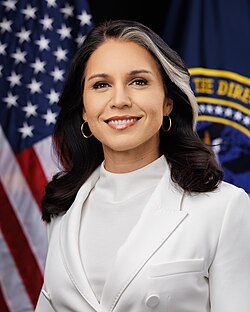
Introduction
Tulsi Gabbard, a politician and United States Army veteran, has made headlines recently due to her unique position on various issues and her polarising political stances. As a former Democratic Congresswoman from Hawaii, Gabbard’s journey in politics has been marked by her distinctive approach to foreign policy, social issues, and her ongoing discourse on the state of American politics. This article takes an in-depth look at her career and the current relevance of her perspectives.
Political Background and Career
Born on April 12, 1981, in Samoa, Gabbard is of mixed descent including Samoan, Indian, and European heritages. She entered politics at a young age, serving in the Hawaii State Legislature from 2002 to 2010. Gabbard gained national prominence when she was elected to the U.S. House of Representatives in 2013, becoming the first Samoan-American and the first Hindu elected to the U.S. Congress. In the House, she notably served on the Foreign Affairs, Armed Services, and Homeland Security Committees.
Key Policies and Public Perception
Gabbard has been particularly vocal about her stances on military intervention, advocating for a non-interventionist foreign policy, which has resonated with a segment of the electorate frustrated with prolonged military engagements. She has also focused on issues like climate change, healthcare access, and a need for political reform, threatening the traditional party lines.
During her 2020 presidential run, Gabbard positioned herself as an outsider within the Democratic Party, capturing attention and controversy alike, particularly when she challenged establishment figures and debated topics traditionally not discussed in intimate political settings. This duality of being a veteran while also being critical of military operations has drawn both support and criticism from various corners of the political spectrum.
Recent Developments
Following her departure from the Democratic Party in October 2022, Gabbard has continued to engage with the GOP and has garnered a significant following among conservative circles. Her views on issues like free speech and the handling of COVID-19 initiatives have led to collaborations with prominent conservative figures. As of 2023, Gabbard has maintained a strong social media presence, conducting dialogues poised to challenge the conventional narratives of both major political parties in the United States.
Conclusion
Tulsi Gabbard represents an evolving narrative within American politics — one that advocates for reform and engages in open discussions about military and social issues. As she continues to influence the political discourse, her journey reflects a growing desire among voters for alternative political pathways. Looking ahead, her impact might shape the contours of forthcoming elections, particularly as she appeals to a diverse audience dissatisfied with the status quo. Her ongoing engagement illustrates the shifting political climate in the U.S., positioning her as a figure worth watching in the landscape of American governance.
You may also like

Understanding the Current Political Landscape in the UK

The UKIP Party: Recent Developments and Future Outlook

Boris Johnson: A Look at His Current Political Landscape
SEARCH
LAST NEWS
- Remembering Wendy Richard: The Promise to Co-Star Natalie Cassidy
- How Did Anglian Water Achieve an ‘Essentials’ Rating for Mental Health Accessibility?
- Shai Hope Leads West Indies in T20 World Cup Clash Against South Africa
- What We Know About Weston McKennie: Future at Juventus and Past at Leeds
- What We Know About the Upcoming Live Nation Antitrust Trial